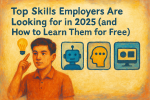Top Skills Employers Are Looking for in 2025 (and How to Learn Them for Free) Ref: 451
Date: Sun Sun 6 Jul 2025 16:43, 16:43The job market is changing faster than ever - and if you want to stand out in 2025, it’s not just about having experience. It’s about having the right skills - especially those that help you adapt to new technologies, collaborate better, and work smarter.
The good news? Many of these in-demand skills can be learned for free - you just need to know where to look and how to practice.
In this article, we’ll break down the top skills employers are seeking in 2025 and exactly how you can start building them today, without spending a penny.
🚀 1. AI Awareness & Prompt Engineering
Artificial Intelligence isn’t replacing all jobs - but people who know how to use AI will definitely have the edge.
Why it matters:
Employers want staff who can use tools like ChatGPT, Midjourney, or Google Gemini to increase productivity, brainstorm, automate tasks, or even write emails faster.
How to learn it for free:
-
OpenAI Learn: https://platform.openai.com/
-
Google AI Courses: https://ai.google/education/
-
YouTube Channels: Search "ChatGPT for productivity" or "prompt engineering basics"
-
Practice tip: Try using ChatGPT to create a cover letter, plan a project, or generate content ideas.
💬 2. Advanced Communication Skills
Remote work, hybrid teams, and AI-powered chat tools are everywhere—but real human communication is still the top soft skill employers crave.
Why it matters:
Clear communication leads to fewer mistakes, stronger teams, and better customer service. Whether in writing or speaking, employers want people who get the message across effectively.
How to learn it for free:
-
LinkedIn Learning (free with library card): Search “communication skills”
-
Coursera (audit mode): Effective Communication: Writing, Design, and Presentation
-
TED Talks: Watch talks on communication styles and techniques
-
Practice tip: Join online forums, Discord groups, or volunteer roles that involve communicating with others.
🌊 3. Adaptability & Growth Mindset
Gone are the days of one job for life. Now, employers want people who learn quickly, adapt fast, and stay calm under change.
Why it matters:
In 2025, many roles are being reshaped. If you can show you're flexible, eager to learn, and open to feedback, you're instantly more attractive.
How to learn it for free:
-
Google’s Free Career Certificates: https://grow.google/certificates/ – Emphasizes lifelong learning
-
Mindset videos on YouTube: Search “growth mindset Carol Dweck”
-
Reddit & Medium articles: Browse personal stories on career changes and how people adapted
Practice tip:
-
Try learning something completely new (a coding course, design, video editing).
-
Journal about how you overcame a recent challenge. This trains you to reflect and grow.
🖥️ 4. Digital Literacy & Modern Tools
Even non-tech jobs now require digital confidence - spreadsheets, project management platforms, design tools, automation apps, etc.
Why it matters:
Employees who know how to navigate tech tools like Notion, Slack, Canva, Trello, or Excel are more efficient and easier to train.
How to learn it for free:
-
Canva Design School: https://www.canva.com/learn/
-
Microsoft Learn (Excel, Teams, etc.): https://learn.microsoft.com/
-
Trello & Notion Guides: Official websites and YouTube tutorials
-
Google Workspace Training: https://workspace.google.com/training/
Practice tip:
Use Trello to plan your job search or build a simple online portfolio in Notion.
🔍 Bonus: How to Prove These Skills in Your CV or Interview
📌 Show, don’t just tell. Instead of saying “great communication skills,” say:
“Collaborated with a remote team across 3 time zones to deliver a project ahead of deadline, using tools like Slack and Trello.”
📌 Include mini case studies or examples in your application or LinkedIn summary.
📌 Link to your work: Include links to blog posts, Canva designs, Notion portfolios, or GitHub repositories (if relevant).
Final Thoughts
The world of work is shifting, but the smartest jobseekers are those who evolve with it.
You don’t need to go back to university or spend thousands - you just need to start learning, even 20 minutes a day. With free tools and platforms available at your fingertips, there’s no excuse not to grow.
✨ Keep upskilling, keep adapting - and your next job could be closer than you think.

